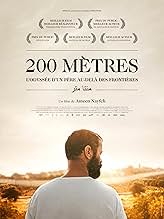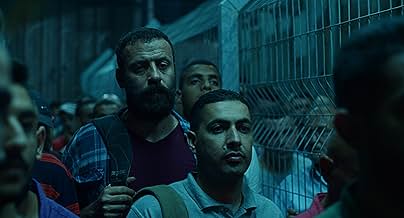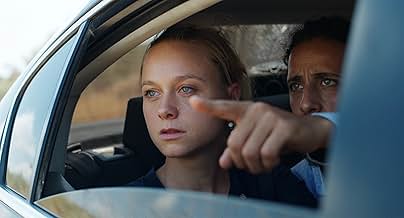AVALIAÇÃO DA IMDb
7,2/10
2,4 mil
SUA AVALIAÇÃO
Um pai palestiniano preso no outro lado do muro de separação tenta chegar ao hospital para ir buscar o seu filho.Um pai palestiniano preso no outro lado do muro de separação tenta chegar ao hospital para ir buscar o seu filho.Um pai palestiniano preso no outro lado do muro de separação tenta chegar ao hospital para ir buscar o seu filho.
- Prêmios
- 19 vitórias e 6 indicações no total
Avaliações em destaque
I once listened to a Jordanian Ambassador to the USA talk before an audience about his search for a word in Arabic which meant "compromise" in the sense of the very western English expression to have a "win-win situation" where both sides give up something in order to gain something and both feel like they have 'won'. He said that despite his best efforts he never found such a word in Arabic. He said that in Arabic culture there is only a sense of winning and losing. If one loses something he cannot be a winner. It is all or nothing. Black and White! The Victors and the Vanquished! All of which he said illustrated the culture gap between western democracies and Arab countries. This film somewhat explores this ideological divide.
This ideological divide is essentially the huge gap that separates Mustafa who refuses to compromise his non-Israeli Arab ideology for the welfare of his family, and Mustafa's Arab-Israeli compromising wife who he allows to live on the other side of the wall in order to raise his children in 'better' schools, etc. The fact that they still love each other in this film is a bit of an anomaly in this war of cultures.
This theme is also the background to the huge gap that separates the Arabic speaking Muslims of the West Bank from the Hebrew speaking Israelis on the other side of the wall. While Israeli's have at times tried be more pragmatic in their relations with the Arab speaking Muslims, their efforts have not been generally reciprocated and the Israelis built a wall of separation as much to keep non-Israeli Arabs out as to keep Israelis in.
Neither side is innocent in the ongoing conflict and Mustafa and his wife epitomize this divide to a large degree: the divide that separates idealists and pragmatists which ultimately keep Mustafa and his wife on opposite sides of the wall. His wife is effectively a pragmatist as are most of the Israeli Arabs who live in Israel. Mustafa is an idealist who will not compromise on his principals and is willing to give up a normal family existence living with his wife and children for a life of separation.
Who's to blame for this wall of separation? The Israelis? The non-Israeli Arabs? The film doesn't really explore the blame game very deeply, it just tries to film the craziness of it all mostly, though not exclusively, through the filter of the eyes of non-Israelis. So a bit one-sided as might be expected and no real solutions are presented ... and the craziness just continues.
I have no personal skin in this conflict and I do not believe given the history and cultures of both sides that there is likely to be any really viable solution that would meet the definition of a win-win situation anytime in the near or the more distant future. This film sort of illustrates this as much as it can be illustrated.
It is worth a watch, though the film offers little hope in my opinion for any real change as it documents the 'craziness' of both sides!
This ideological divide is essentially the huge gap that separates Mustafa who refuses to compromise his non-Israeli Arab ideology for the welfare of his family, and Mustafa's Arab-Israeli compromising wife who he allows to live on the other side of the wall in order to raise his children in 'better' schools, etc. The fact that they still love each other in this film is a bit of an anomaly in this war of cultures.
This theme is also the background to the huge gap that separates the Arabic speaking Muslims of the West Bank from the Hebrew speaking Israelis on the other side of the wall. While Israeli's have at times tried be more pragmatic in their relations with the Arab speaking Muslims, their efforts have not been generally reciprocated and the Israelis built a wall of separation as much to keep non-Israeli Arabs out as to keep Israelis in.
Neither side is innocent in the ongoing conflict and Mustafa and his wife epitomize this divide to a large degree: the divide that separates idealists and pragmatists which ultimately keep Mustafa and his wife on opposite sides of the wall. His wife is effectively a pragmatist as are most of the Israeli Arabs who live in Israel. Mustafa is an idealist who will not compromise on his principals and is willing to give up a normal family existence living with his wife and children for a life of separation.
Who's to blame for this wall of separation? The Israelis? The non-Israeli Arabs? The film doesn't really explore the blame game very deeply, it just tries to film the craziness of it all mostly, though not exclusively, through the filter of the eyes of non-Israelis. So a bit one-sided as might be expected and no real solutions are presented ... and the craziness just continues.
I have no personal skin in this conflict and I do not believe given the history and cultures of both sides that there is likely to be any really viable solution that would meet the definition of a win-win situation anytime in the near or the more distant future. This film sort of illustrates this as much as it can be illustrated.
It is worth a watch, though the film offers little hope in my opinion for any real change as it documents the 'craziness' of both sides!
I heard heard good things about this film, but having a quick peek on IMDB to read the first user review giving it 1/10, I had my reservations.
These were quickly dispelled as I felt myself being taken into the life of Mustufa and his family (Mustufa is brilliantly acted by Ali Suliman)
The movie has wonderful cinematography, showing the harsh yet warm scenery beautifully, with tender music accompanying the scenes to pull heart stings when required, but not to over sensationalise it.
As someone with no skin in the game for either side, I thought it was an extremely fair and balanced portrayal of the struggles of Palestinian families living in and around the West Bank and travelling through checkpoints daily.
Whatever you think of the situation, I would look at this film with open eyes, and you will be pleasantly surprised.
After the film finished, I checked IMDB to see who had directed it, and was more than surprized to find it was also a feature film directorial debut from the writer Ameen Nayfeh.
Looking forward to more of her films!
These were quickly dispelled as I felt myself being taken into the life of Mustufa and his family (Mustufa is brilliantly acted by Ali Suliman)
The movie has wonderful cinematography, showing the harsh yet warm scenery beautifully, with tender music accompanying the scenes to pull heart stings when required, but not to over sensationalise it.
As someone with no skin in the game for either side, I thought it was an extremely fair and balanced portrayal of the struggles of Palestinian families living in and around the West Bank and travelling through checkpoints daily.
Whatever you think of the situation, I would look at this film with open eyes, and you will be pleasantly surprised.
After the film finished, I checked IMDB to see who had directed it, and was more than surprized to find it was also a feature film directorial debut from the writer Ameen Nayfeh.
Looking forward to more of her films!
I am rating this at 9, although very rarely I have given such a high rating, and the reasons why I believe this film deserves a solid 9 is the fact that palestinian cinema and film industry has improved so much in the last few years, and Palestinian film makers have worked so hard for years to get some screen time, and now they're portraying the reality so vividly and using the real Palestinian narrative that's widely censored and silenced.
The production is amazing, the actors are very talented and genuine, the music is so fitting and expressive of the scenes.
The fact that this is a reality in Palestine today is appalling, we are living in a world that still tolerates this in 2020.
I think such productions and stories are the ambassadors of this cause, and they are doing a good and talented job at it, they are telling a narrative that's parallel to the stereotype, and more powerful sometimes.
Well done the talented Ameen Nayfeh, and to Ms Odeh.
The fact that this is a reality in Palestine today is appalling, we are living in a world that still tolerates this in 2020.
I think such productions and stories are the ambassadors of this cause, and they are doing a good and talented job at it, they are telling a narrative that's parallel to the stereotype, and more powerful sometimes.
Well done the talented Ameen Nayfeh, and to Ms Odeh.
There are other good Palestinian movies that tackle the Palestinian question and its impact on the everyday life of people in the occupied territories. Examples of this are: Omar, Salt in This Sea, Tel Aviv on Fire and Pomegranates and Myrrh.
What makes 200 Meters stand out is the ironic realization, visually rendered, that only 200 meters separate husband from his wife and kids. But in order for him to be with them, he has to cross the border to be in Israel. But to do so, he has to have a permit. This is a reality which Mustafa accepts, if grudgingly.
The road trip that ensues for Mustafa and several others like him in the West Bank, who need to cross the border illegally, is the focus of the movie. This is where the drama comes in and the tension builds up.
Ali Suliman anchors the film and he portrays his role as the desperate father superbly. There is a big surprise at the end, and the viewer has to judge what to make of it. But I think the point of the writer/filmmaker is to show that even people with sympathies for Israel want to learn more about the Palestinian narrative as an impartial observer (and perhaps offer a solution) as it affects the daily life of people living beyond the wall.
Watch this film not only to be entertained, which it does, but to be reminded that the Palestinian problem begs for a fair solution.
What makes 200 Meters stand out is the ironic realization, visually rendered, that only 200 meters separate husband from his wife and kids. But in order for him to be with them, he has to cross the border to be in Israel. But to do so, he has to have a permit. This is a reality which Mustafa accepts, if grudgingly.
The road trip that ensues for Mustafa and several others like him in the West Bank, who need to cross the border illegally, is the focus of the movie. This is where the drama comes in and the tension builds up.
Ali Suliman anchors the film and he portrays his role as the desperate father superbly. There is a big surprise at the end, and the viewer has to judge what to make of it. But I think the point of the writer/filmmaker is to show that even people with sympathies for Israel want to learn more about the Palestinian narrative as an impartial observer (and perhaps offer a solution) as it affects the daily life of people living beyond the wall.
Watch this film not only to be entertained, which it does, but to be reminded that the Palestinian problem begs for a fair solution.
So deep , touching and simple at the same time, fully engaged from the 1st scene till the last one
Must watch on big screen
Você sabia?
- CuriosidadesOfficial submission of Jordan for the 'Best International Feature Film' category of the 93rd Academy Awards in 2021.
Principais escolhas
Faça login para avaliar e ver a lista de recomendações personalizadas
- How long is 200 Meters?Fornecido pela Alexa
Detalhes
Bilheteria
- Faturamento bruto mundial
- US$ 76.485
- Tempo de duração1 hora 36 minutos
- Cor
Contribua para esta página
Sugerir uma alteração ou adicionar conteúdo ausente


![Assistir a Trailer [OV]](https://m.media-amazon.com/images/M/MV5BOTUyZTlkZTktNjEyZS00NmE5LWJlZDEtZGZlODRlZTMxYmIwXkEyXkFqcGdeQXRyYW5zY29kZS13b3JrZmxvdw@@._V1_QL75_UX500_CR0)





















